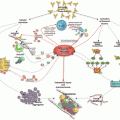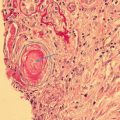Manifestations
Strength of evidence
Stroke/transient ischemic attack
Strong association based on large sample size prospective studies
Cognitive dysfunction
Migraine
Seizure/epilepsy
Frequently reported but based on small sample size prospective studies and retrospective cohorts
Psychosis
Chorea
Multiple sclerosis-like symptoms
Myelitis
Idiopathic intracranial hypertension
Transient global amnesia
Hypertrophic pachymeningitis
Infrequently reported based on small sample size prospective or retrospective studies or case reports
References
1.
Hughes GR. Thrombosis, abortion, cerebral disease, and the lupus anticoagulant. Br Med J Clin Res Ed. 1983;15(287):1088–9.
2.
Miyakis S, Lockshin MD, Atsumi T, et al. International consensus statement on an update of the classification criteria for definite antiphospholipid syndrome (APS). J Thromb Haemost JTH. 2006;4:295–306.PubMed
3.
Hess DC, Krauss J, Adams RJ, Nichols FT, Zhang D, Rountree HA. Anticardiolipin antibodies: a study of frequency in TIA and stroke. Neurology. 1991;41:525–8.PubMed
4.
Ginsburg KS, Liang MH, Newcomer L, et al. Anticardiolipin antibodies and the risk for ischemic stroke and venous thrombosis. Ann Intern Med. 1992;15:997–1002.
5.
Cervera R, Piette J-C, Font J, et al. Antiphospholipid syndrome: clinical and immunologic manifestations and patterns of disease expression in a cohort of 1,000 patients. Arthritis Rheum. 2002;46:1019–27.PubMed
6.
Andreoli L, Chighizola CB, Banzato A, Pons-Estel GJ, Ramire de Jesus G, Erkan D. Estimated frequency of antiphospholipid antibodies in patients with pregnancy morbidity, stroke, myocardial infarction, and deep vein thrombosis: a critical review of the literature. Arthritis Care Res. 2013;65:1869–73.
7.
Urbanus RT, Siegerink B, Roest M, Rosendaal FR, de Groot PG, Algra A. Antiphospholipid antibodies and risk of myocardial infarction and ischaemic stroke in young women in the RATIO study: a case-control study. Lancet Neurol. 2009;8:998–1005.PubMed
8.
Galli M, Luciani D, Bertolini G, Barbui T. Lupus anticoagulants are stronger risk factors for thrombosis than anticardiolipin antibodies in the antiphospholipid syndrome: a systematic review of the literature. Blood. 2003;1:1827–32.
9.
Sciascia S, Sanna G, Khamashta MA, et al. The estimated frequency of antiphospholipid antibodies in young adults with cerebrovascular events: a systematic review. Ann Rheum Dis. 2015;74:2028–33.PubMed
10.
Zuily S, Regnault V, Selton-Suty C, et al. Increased risk for heart valve disease associated with antiphospholipid antibodies in patients with systemic lupus erythematosus: meta-analysis of echocardiographic studies. Circulation. 2011;12:215–24.
11.
Pezzini A, Grassi M, Lodigiani C, et al. Predictors of long-term recurrent vascular events after ischemic stroke at young age: the Italian Project on Stroke in Young Adults. Circulation. 2014;22:1668–76.
12.
Brey RL, Escalante A. Neurological manifestations of antiphospholipid antibody syndrome. Lupus. 1998;7(Suppl 2):S67–74.PubMed
13.
Erkan D, Kozora E, Lockshin MD. Cognitive dysfunction and white matter abnormalities in antiphospholipid syndrome. Pathophysiol Off J Int Soc Pathophysiol ISP. 2011;18:93–102.
14.
Hachulla E, Michon-Pasturel U, Leys D, et al. Cerebral magnetic resonance imaging in patients with or without antiphospholipid antibodies. Lupus. 1998;7:124–31.PubMed
15.
Pierangeli SS, Colden-Stanfield M, Liu X, Barker JH, Anderson GL, Harris EN. Antiphospholipid antibodies from antiphospholipid syndrome patients activate endothelial cells in vitro and in vivo. Circulation. 1999;20:1997–2002.
16.
Pierangeli SS, Espinola RG, Liu X, Harris EN. Thrombogenic effects of antiphospholipid antibodies are mediated by intercellular cell adhesion molecule-1, vascular cell adhesion molecule-1, and P-selectin. Circ Res. 2001;2(88):245–50.
17.
Arad A, Proulle V, Furie RA, Furie BC, Furie B. 2-glycoprotein-1 autoantibodies from patients with antiphospholipid syndrome are sufficient to potentiate arterial thrombus formation in a mouse model. Blood. 2011;18:3453–9.
18.
Urbanus RT, Derksen RHWM, de Groot PG. Platelets and the antiphospholipid syndrome. Lupus. 2008;17:888–94.PubMed
19.
Brandt KJ, Kruithof EKO, de Moerloose P. Receptors involved in cell activation by antiphospholipid antibodies. Thromb Res. 2013;132:408–13.PubMed
20.
Lambert M, Boullier A, Hachulla E, et al. Paraoxonase activity is dramatically decreased in patients positive for anticardiolipin antibodies. Lupus. 2000;9:299–300.PubMed
21.
Charakida M, Besler C, Batuca JR, et al. Vascular abnormalities, paraoxonase activity, and dysfunctional HDL in primary antiphospholipid syndrome. JAMA J Am Med Assoc. 2009;16:1210–7.
22.
Kobayashi K, Kishi M, Atsumi T, et al. Circulating oxidized LDL forms complexes with beta2-glycoprotein I: implication as an atherogenic autoantigen. J Lipid Res. 2003;44:716–26.PubMed
24.
Harats D, George J, Levy Y, Khamashta MA, Hughes GR, Shoenfeld Y. Atheroma: links with antiphospholipid antibodies, Hughes syndrome and lupus. QJM Mon J Assoc Physicians. 1999;92:57–9.
25.
Jacobson MW, Rapport LJ, Keenan PA, Coleman RD, Tietjen GE. Neuropsychological deficits associated with antiphospholipid antibodies. J Clin Exp Neuropsychol. 1999;21:251–64.PubMed
26.
Erkan D, Barbhaiya M, George D, Sammaritano L, Lockshin M. Moderate versus high-titer persistently anticardiolipin antibody positive patients: are they clinically different and does high-titer anti-beta 2-glycoprotein-I antibody positivity offer additional predictive information? Lupus. 2010;19:613–9.PubMed
27.
Kozora E, Erkan D, Zhang L, et al. Cognitive dysfunction in antiphospholipid antibody (aPL)-negative systemic lupus erythematosus (SLE) versus aPL-positive non-SLE patients. Clin Exp Rheumatol. 2014;32:34–40.PubMed
28.
Tektonidou MG, Varsou N, Kotoulas G, Antoniou A, Moutsopoulos HM. Cognitive deficits in patients with antiphospholipid syndrome: association with clinical, laboratory, and brain magnetic resonance imaging findings. Arch Intern Med. 2006;13:2278–84.
29.
Coín MA, Vilar-López R, Peralta-Ramírez I, et al. The role of antiphospholipid autoantibodies in the cognitive deficits of patients with systemic lupus erythematosus. Lupus. 2015;24:875–9.PubMed
30.
Arvanitakis Z, Brey RL, Rand JH, et al. Antiphospholipid antibodies, brain infarcts, and cognitive and motor decline in aging (ABICMA): design of a community-based, longitudinal, clinical-pathological study. Neuroepidemiology. 2013;40:73–84.PubMed
31.
Juby A, Davis P, Genge T, McElhaney J. Anticardiolipin antibodies in two elderly subpopulations. Lupus. 1995;4:482–5.PubMed
32.
Mosek A, Yust I, Treves TA, Vardinon N, Korczyn AD, Chapman J. Dementia and antiphospholipid antibodies. Dement Geriatr Cogn Disord. 2000;11:36–8.PubMed
33.
Chapman J, Abu-Katash M, Inzelberg R, et al. Prevalence and clinical features of dementia associated with the antiphospholipid syndrome and circulating anticoagulants. J Neurol Sci. 2002;15:81–4.
34.
Gómez-Puerta JA, Cervera R, Calvo LM, et al. Dementia associated with the antiphospholipid syndrome: clinical and radiological characteristics of 30 patients. Rheumatology (Oxford). 2005;44:95–9.
35.
Schmidt R, Auer-Grumbach P, Fazekas F, Offenbacher H, Kapeller P. Anticardiolipin antibodies in normal subjects. Neuropsychological correlates and MRI findings. Stroke J Cereb Circ. 1995;26:749–54.
36.
Zhu D-S, Fu J, Zhang Y, et al. Neurological antiphospholipid syndrome: clinical, neuroimaging, and pathological characteristics. J Neurol Sci. 2014;15:138–44.
37.
Kozora E, Uluğ AM, Erkan D, et al. Functional magnetic resonance imaging of working memory and executive dysfunction in systemic lupus erythematosus and antiphospholipid antibody-positive patients. Arthritis Care Res. 2016;68:1655–63.
38.
Tomietto P, Annese V, D’agostini S, et al. General and specific factors associated with severity of cognitive impairment in systemic lupus erythematosus. Arthritis Rheum. 2007;15:1461–72.
39.
Murray SG, Yazdany J, Kaiser R, et al. Cardiovascular disease and cognitive dysfunction in systemic lupus erythematosus. Arthritis Care Res. 2012;64:1328–33.
40.
Afeltra A, Garzia P, Mitterhofer AP, et al. Neuropsychiatric lupus syndromes: relationship with antiphospholipid antibodies. Neurology. 2003;8:108–10.
41.
Mikdashi J, Handwerger B. Predictors of neuropsychiatric damage in systemic lupus erythematosus: data from the Maryland lupus cohort. Rheumatol Oxf Engl. 2004;43:1555–60.
42.
McLaurin EY, Holliday SL, Williams P, Brey RL. Predictors of cognitive dysfunction in patients with systemic lupus erythematosus. Neurology. 2005;25:297–303.
43.
Menon S, Jameson-Shortall E, Newman SP, Hall-Craggs MR, Chinn R, Isenberg DA. A longitudinal study of anticardiolipin antibody levels and cognitive functioning in systemic lupus erythematosus. Arthritis Rheum. 1999;42:735–41.PubMed
44.
Hanly JG, McCurdy G, Fougere L, Douglas J-A, Thompson K. Neuropsychiatric events in systemic lupus erythematosus: attribution and clinical significance. J Rheumatol. 2004;31:2156–62.PubMed
45.
Conti F, Alessandri C, Perricone C, Scrivo R, Rezai S, Ceccarelli F, et al. Neurocognitive dysfunction in systemic lupus erythematosus: association with antiphospholipid antibodies, disease activity and chronic damage. PLoS One. 2012;7:e33824.PubMedPubMedCentral
46.
Hanly JG, Hong C, Smith S, Fisk JD. A prospective analysis of cognitive function and anticardiolipin antibodies in systemic lupus erythematosus. Arthritis Rheum. 1999;42:728–34.PubMed
47.
Borowoy AM, Pope JE, Silverman E, et al. Neuropsychiatric lupus: the prevalence and autoantibody associations depend on the definition: results from the 1000 faces of lupus cohort. Semin Arthritis Rheum. 2012;42:179–85.PubMed
Stay updated, free articles. Join our Telegram channel

Full access? Get Clinical Tree





